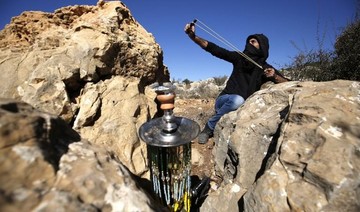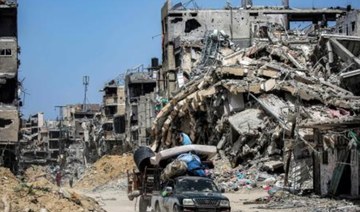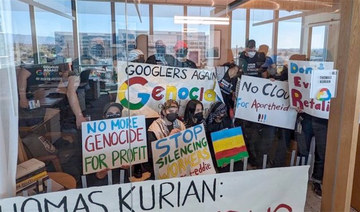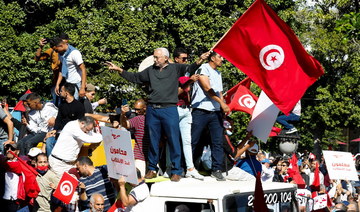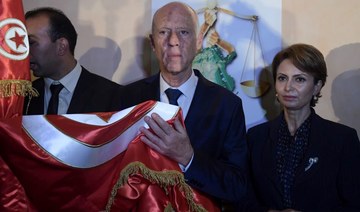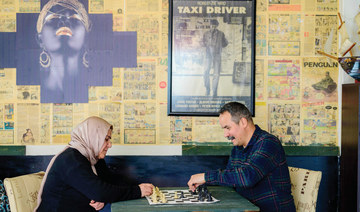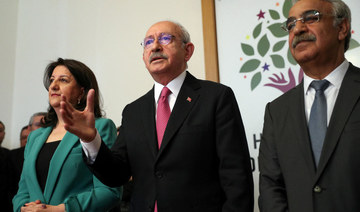JERUSALEM: In an alley in Jerusalem’s Old City, a three-story building has become a symbol of Palestinian fears they are losing precious ground in the historic area.
Adeeb Joudeh Al-Husseini says he did nothing wrong, but even his status as a member of one of Jerusalem’s most prominent Palestinian families did not shield him from the blowback.
The 55-year-old was accused of being behind the sale of the Mamluk-style building in the Old City’s Muslim quarter to Israeli settlers — something most Palestinians consider treason.
“Can we be held accountable for something that was sold over two years ago?” he asks as he sits at the entrance to the Church of the Holy Sepulchre, built at the spot where Christians believe Jesus was crucified and buried.
Joudeh, as his family is known, is one of the keepers of the keys of the church and has faced calls to relinquish that role over the sale.
He proudly brandishes the long, arrow-shaped key — which the Muslim family says it has handed down from father to son since the 13th century — as proof of his innocence.
Joudeh says he sold the property to another Palestinian in 2016 for $2.5 million and cannot be held responsible if it was passed on to settlers, who moved there in late 2018.
But the building he once owned is not the only one triggering Palestinian concerns.
The land conflict between Palestinians and Israelis is also a battle over Jerusalem and its Old City, home to sites holy to Jews, Muslims and Christians.
Israel took over mainly Palestinian east Jerusalem in the 1967 Six-Day War and later annexed it in a move never recognized by the international community.
It now considers the entire city its capital, citing the Jewish historical and biblical connection there.
The Palestinians see east Jerusalem, which includes the Old City, as the capital of their future state.
They consider each property sale to Israeli settlers there as another blow to their cause.
Some 320,000 Palestinians live in east Jerusalem, while the Israeli settler population there has now grown to 210,000.
Israel bars the Palestinian Authority from operating in Jerusalem, but it seeks to maintain influence, however limited.
Such sales can in theory carry the death penalty under PA law.
In one high-profile case in recent weeks, an American-Palestinian man, Issam Akel, was sentenced to life in prison by a PA court in the occupied West Bank over a property sale in the Old City.
Akel’s lawyer, Oday Nawfel, said he was simply trying to help another Palestinian family sort out inheritance issues with the building, down the street from the one Joudeh sold.
Akel’s case has drawn criticism from David Friedman, the US ambassador to Israel, who has been a supporter of settlements and has called for Akel’s release.
It also led to calls in Israel for authorities there to act.
Following Akel’s arrest, Israel detained the Palestinian governor of Jerusalem a number of times over suspicions of involvement in the affair.
Another 32 Palestinians were arrested by Israeli forces on similar grounds that they were supporting the PA in the matter, but eventually all were released.
Akel was reported to have been released this past week on condition he leaves for the US, though neither his lawyer nor the US embassy confirmed the deal.
In a separate case in November, the highest Muslim authority in Jerusalem, Grand Mufti Muhammad Ahmad Hussein, refused to allow a Palestinian killed in a car accident to be buried in a Muslim cemetery over suspicions he had once sold property to Jews.
Israeli settler groups push to make deals happen as part of their efforts to increase the Jewish population in east Jerusalem, sometimes offering exorbitant sums to pressure owners to sell.
The groups use a variety of means such as middlemen or shell companies, anti-settlement activists say.
“These are not open, transparent transactions,” said Yudith Oppenheimer, who heads Ir Amim, an Israeli anti-settlement NGO focused on Jerusalem.
Daniel Luria of Ateret Cohanim, which works to increase the Jewish population of east Jerusalem, defended its actions.
“Everyone should be able to buy and sell” in areas under Israeli sovereignty, said Luria.
Joudeh displays documents that he says show the PA validated the sale of his home to another Palestinian.
He says the buyer “betrayed me, betrayed the Palestinian Authority and Palestine.”
The Palestinian who in 2016 bought the house, Khaled Al-Atari, refused to speak with AFP citing an ongoing investigation on the Palestinian side.
Regardless of who was responsible, neighbors fear more such sales are ahead.
In Jerusalem’s Old City, conflict means buyer and seller beware
In Jerusalem’s Old City, conflict means buyer and seller beware
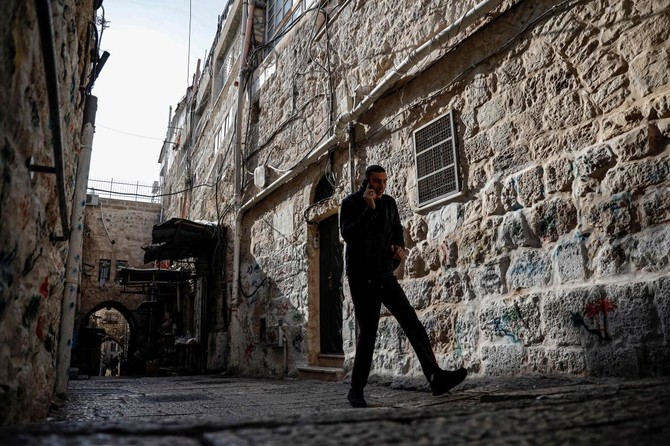
- ‘Can we be held accountable for something that was sold over two years ago?’
- The land conflict between Palestinians and Israelis is also a battle over Jerusalem and its Old City
Egypt denies any discussions with Israel over Rafah offensive
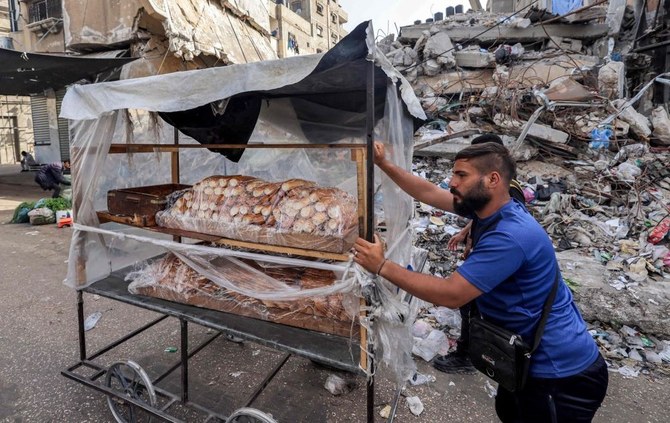
- Egypt reiterates opposition to any move on Rafah
- Warnings tell of expected losses and negative repercussions
CAIRO: Egypt has denied any discussions with Israel regarding an offensive in the Palestinian city of Rafah in the southern Gaza Strip.
Diaa Rashwan, the head of Egypt’s State Information Service, has refuted what has been claimed in one of the major American newspapers: that Egypt has discussed with the Israeli side its plans for an offensive in Rafah.
Rashwan has affirmed the Egyptian stance — announced several times by its political leadership — of complete opposition to the operation, which it is thought will lead to further massacres, massive human losses, and widespread destruction.
He added that Egypt’s repeated warnings have reached the Israeli side, from all channels, since Israel proposed carrying out a military operation in Rafah. These warnings tell of expected losses and the negative repercussions on the stability of the entire region.
Rashwan added that while Israel is contemplating its operation — which Egypt and most of the world and its international institutions stand against — Egyptian efforts since the beginning of the Israeli aggression had focused on reaching a ceasefire agreement and the exchange of prisoners and detainees.
He said Egypt was seeking the entry of humanitarian aid into the Gaza Strip, especially the north and Gaza City, and the evacuation of wounded and sick people for treatment outside the area.
Egypt has repeatedly opposed the displacement of Palestinians from Gaza and is warning against any military operation in Rafah.
UAE announces $544m for repairs after record rains
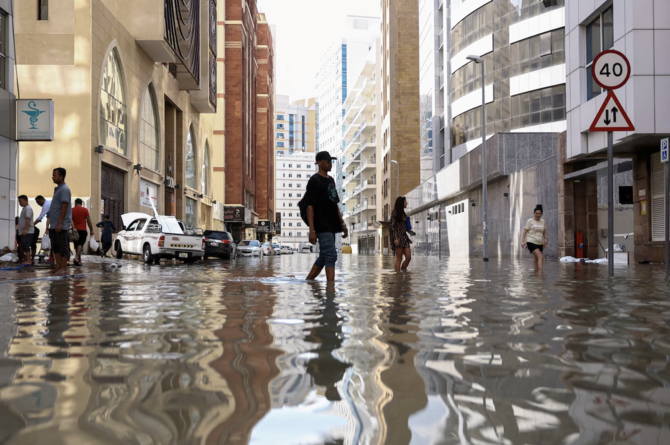
- Wednesday's announcement comes more than a week after the unprecedented deluge lashed the desert country
- “The situation was unprecedented in its severity but we are a country that learns from every experience,” Sheikh Mohammed said
DUBAI: The United Arab Emirates announced $544 million to repair the homes of Emirati families on Wednesday after last week’s record rains caused widespread flooding and brought the Gulf state to a standstill.
“We learned great lessons in dealing with severe rains,” said Prime Minister Sheikh Mohammed bin Rashid Al-Maktoum after a cabinet meeting, adding that ministers approved “two billion dirhams to deal with damage to the homes of citizens.”
Wednesday’s announcement comes more than a week after the unprecedented deluge lashed the desert country, where it turned streets into rivers and hobbled Dubai airport, the world’s busiest for international passengers.
“A ministerial committee was assigned to follow up on this file... and disburse compensation in cooperation with the rest of the federal and local authorities,” said Sheikh Mohammed, who is also the ruler of Dubai, which was one of the worst hit of the UAE’s seven sheikhdoms.
The rainfall was the UAE’s heaviest since records began 75 years ago.
Cabinet ministers also formed a second committee to log infrastructure damage and propose solutions, Sheikh Mohammed said in a post on X, formerly Twitter.
“The situation was unprecedented in its severity but we are a country that learns from every experience,” he said.
The storm, which dumped up to two years’ worth of rain on the UAE, had subsided by last Wednesday.
But Dubai faced severe disruption for days later, with water-clogged roads and flooded homes.
Dubai airport canceled 2,155 flights, diverted 115 and did not return to full capacity until Tuesday.
Israeli army strikes 40 Hezbollah targets in south Lebanon
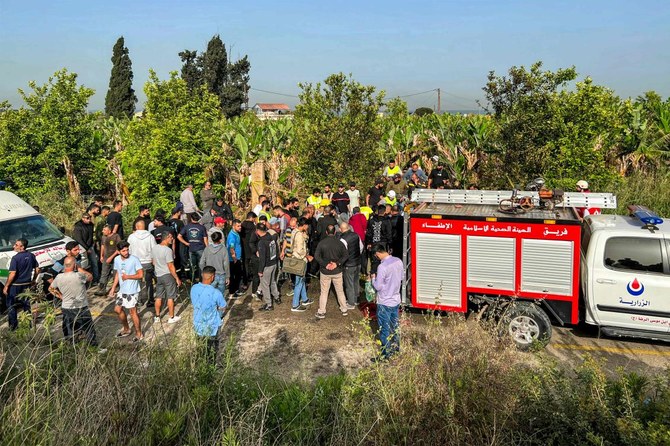
- Hezbollah has exchanged near-daily fire with the Israeli army
- Israel says 11 soldiers and eight civilians have been killed on its side of the border
Beirut: The Israeli army said Wednesday it struck 40 Hezbollah targets in southern Lebanon as near-daily exchanges of fire rage on the border between the two countries.
“A short while ago, IDF (army) fighter jets and artillery struck approximately 40 Hezbollah terror targets” around Aita Al-Shaab in southern Lebanon, including storage facilities and weaponry, the army said in a statement.
Lebanon’s Iran-backed Hezbollah movement said it fired a fresh barrage of rockets across the border earlier in the day after a strike blamed on Israel killed two civilians.
The group had already fired rockets at northern Israel late on Tuesday “in response” to the civilian deaths.
Hezbollah has exchanged near-daily fire with the Israeli army since its ally Hamas carried out an unprecedented attack on Israel on October 7, triggering war in Gaza.
It has stepped up its rocket fire on Israeli military bases in recent days.
Hezbollah fighters fired “dozens of Katyusha rockets” at a border village in northern Israel “as part of the response to the Israeli enemy’s attacks on... civilian homes,” the group said in a statement.
On Tuesday, rescue teams said an Israeli strike on a house in the southern village of Hanin killed a woman in her fifties and a girl from the same family.
Since October 7, at least 380 people have been killed in Lebanon, mostly Hezbollah fighters but also 72 civilians, according to an AFP tally.
Israel says 11 soldiers and eight civilians have been killed on its side of the border.
Tunisia law professors call for release of detained opposition figures
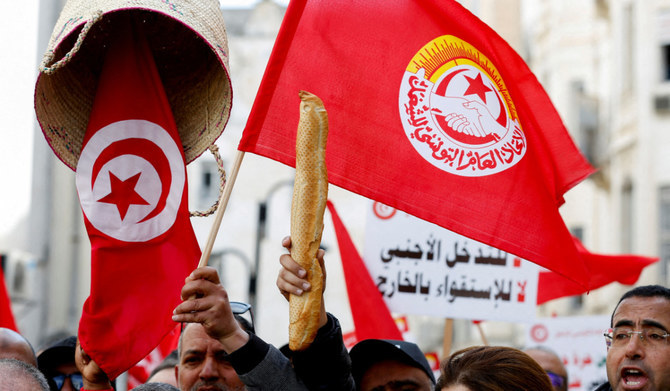
- Since a flurry of arrests in February 2023, around 40 critics of President Kais Saied have been facing charges of “conspiracy against the state“
- Eight of the critics have been detained since, and have yet to see trial
TUNIS: More than 30 Tunisian law professors on Wednesday called for the release of several political opposition figures arrested last year, pointing out that the 14-month legal limit for pre-trial detention had passed.
Since a flurry of arrests in February 2023, around 40 critics of President Kais Saied have been facing charges of “conspiracy against the state.”
Eight of the critics have been detained since, and have yet to see trial.
They were expected to be released earlier this month after their detention was extended twice — four months each time — following an initial six-month stint, their lawyers said.
Yet all eight remain in detention after a court hearing on their case was put off until May 2.
This means they have been detained for more than 14 months without trial, which is the limit under Tunisian law.
“Keeping them in prison beyond the period of preventive detention is a violation (of Tunisian law),” read a statement signed by 33 law professors, including three deans.
The professors said the eight must be released, accusing the Tunisian authorities of putting them in what they called “forced detention.”
The country’s anti-terrorism court is investigating the political opponents for trying to “change the nature of the state” under Tunisia’s penal code.
In a letter addressed to President Saied last month, rights group Amnesty International called for the “immediate and unconditional” release of the detainees.
“I call on you to cease your targeted arrests of critics for the peaceful exercise of their rights to freedom of expression,” the letter read.
Saied, a former law professor, has ruled by decree since orchestrating a sweeping power grab in July 2021 in Tunisia, which saw the onset of what came to be known as the Arab Spring a decade earlier.
The eight detainees include former Islamist-inspired Ennahdha party figure Abdelhamid Jelassi, co-founder of the left-wing National Salvation Front coalition Jawhar Ben Mbarek and political activist Khayam Turki.
After the wave of arrests last year, the United Nations voiced alarm over “the deepening crackdown against perceived political opponents and civil society in Tunisia, including attacks on the independence of the judiciary.”
Critics have denounced Saied’s crackdown on opponents, accusing him of exploiting Tunisia’s judiciary as the country prepares for presidential elections set to take place later this year.
Turkish minister warns pro-Kurdish party it could face moves to ban it
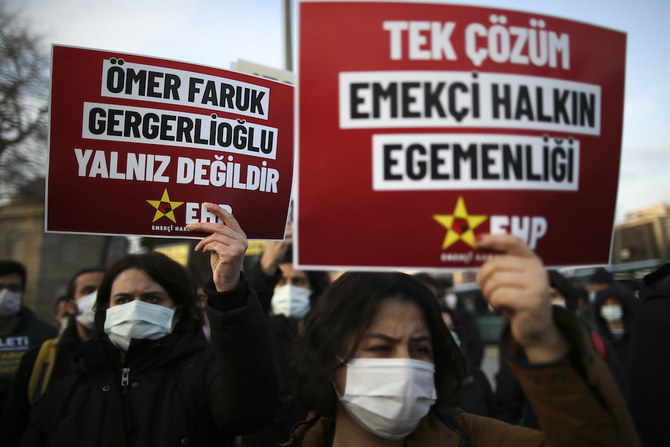
- “In the past, closure cases were opened against parties for supporting terrorism,” Justice Minister Yilmaz Tunc told reporters in Ankara
- “Therefore, we say that if the DEM Party follows the same path, then it will face the same treatment”
ISTANBUL: Turkiye’s justice minister warned the country’s main pro-Kurdish DEM party on Wednesday that it would face the risk of legal action, and even a closure case like its predecessor, if it did not distance itself from Kurdish militants.
DEM, parliament’s third largest party, was established last year as a successor to the Peoples’ Democratic Party (HDP), which is facing the prospect of closure over alleged militant links in a court case following a years-long crackdown.
“In the past, closure cases were opened against parties for supporting terrorism,” Justice Minister Yilmaz Tunc told reporters in Ankara, noting that some parties had been banned and that other cases were ongoing.
“Therefore, we say that if the DEM Party follows the same path, then it will face the same treatment,” he said. “We say keep your distance from terrorism if you do not want to face such a legal process.”
Another court had been expected to announce a verdict this month in a case trying jailed former HDP leaders and officials over 2014 protests triggered by a Daesh attack on the Syrian Kurdish town of Kobani. That verdict was postponed.
“They should not wag their fingers at us. I repeat, the policy of closure, blackmail and threats is over,” DEM Party co-chair Tuncer Bakirhan said on Wednesday in the wake of a call from a government ally to ban the DEM Party.
Critics say Turkish courts are under the influence of the government and President Tayyip Erdogan, which he and his AK Party (AKP) deny.
Both prosecutors and the government accuse the HDP of ties to the militant Kurdistan Workers Party (PKK), which is deemed a terrorist group by Turkiye, the United States and European Union. The HDP denies having any connections with terrorism.
The PKK launched an insurgency against the Turkish state in 1984 and more than 40,000 people have been killed in the conflict. A peace process between Ankara and the PKK fell apart in 2015 and in a subsequent crackdown on the HDP thousands of its officials and members have been arrested and jailed.


